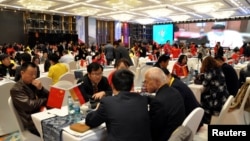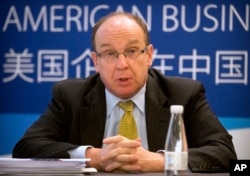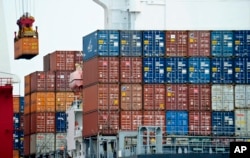China is moving quickly to push forward a draft version of its first Foreign Investment Law this week.
Among other things, the proposed law bans forced technology transfers, guarantees national treatment for foreign investors and steps up intellectual property right protections — all key issues in the ongoing trade dispute with Washington.
It also supports a negative-list management for foreign investment. A list unveiled in June last year cut the number of restricted items down to 48 from 63 and removed access restrictions in several sectors, according to state media.
Analysts note, however, that the way the law is being “rushed through” and the vague wording of many of its 39 clauses is casting some serious doubts on authorities’ ability to enforce the legislation after it is passed.
Being rushed through?
Lester Ross, who chairs the China Policy Committee of the American Chamber of Commerce (AmCham) in Beijing, said he’s concerned about the draft’s expedited review, including a two-day legislative session for the draft bill that begins Tuesday.
The meeting comes before the period of solicitation of public comments is set to end in late February.
China’s largely rubber-stamp legislature, the National People's Congress, is working to fast-track the bill’s passage during its annual meeting in March, which may serve as an olive branch to ease trade tensions with Washington, said Liu Meng-chun of the Chung-Hua Institution of Economic Research (CIER) in Taipei.
While acknowledging the draft’s consistency with the “competitive neutrality” principal, which encourages fair competition between domestic and foreign businesses, Ross said the draft has many shortcomings.
“The problem is that there are many provisions in the law, which do not address the concerns of foreign investors and in addition, the provisions are in some cases so broadly-worded that they actually create a basis for mistreatment of foreign businesses,” he said.
Additional hurdles
For example, article 20 allows the state to take control of foreign investment in the interest of the public. Yet what defines public interest isn’t clear. As is the case when article 33 states the need for safety reviews on foreign businesses, which “influence or are likely to influence national security.” That, Ross said, creates an additional hurdle when the law is intended to reduce hurdles.
As a principal, he urges China to keep restrictions on foreign investment to a minimum in accordance with international norms and China’s own WTO commitments.
Walker Wallace, partner at the U.S. international law firm O’Melveny & Myers' office in Shanghai, finds the draft’s article 39 problematic. As it is currently worded, the article only gives foreign businesses a five-year grace period to reorganize their existing corporate structure — mainly joint ventures or wholly foreign-owned enterprises.
A problematic deadline
“Putting the five-year term limit basically puts the gun to the heads of the joint venture parties and says you have five years to try and reopen… a deal that was closely negotiated before where people made trade-offs one way or another. And that opens up the possibility for all kinds of mischief,” Wallace says.
He said China should allow foreign-invested enterprises to retain their existing corporate structures till the end of their current contract so that no shareholders, for example, a Chinese land owner and a foreign hotel company with an agreement longer than five years, use the opportunity to unfairly renegotiate.
Another issue, he adds, is the bill fails to spell out the consequences foreign businesses will face if they’re unable to complete such reorganization within the time frame.
Wallace also urged China to add provisions to the draft that would allow foreign businesses to be able to freely establish domestic subsidiaries just like their local competitors.
It remains to be seen whether foreign companies will be governed by China’s Company Law after the bill takes effect. If so, the Company Law presents another set of problems, said Ross.
For example, he added, foreign businesses will find it unacceptable to set up a Communist Party branch within the companies, as required by article 19.
Enforceable assurances?
Compared to the 2015 draft, the earlier version of the law, the new bill further opens up the Chinese market to foreign investment through deregulation and institutional reform.
But how that will all play out in practice remains to be seen as the law’s enforcement will be handled by local governments, CIER’s Liu noted.
“China has often embraced protectionist policies at the local level. If the open-up policy involves sectors that have long been dominated by local government-owned enterprises, it means these government-run companies will now face foreign competition. Given that their performance is tied to local governments’ fiscal [health], it remains to be seen if local authorities will fully execute the central government’s policies,” the economist said.
In other words, the removal of hidden hurdles for foreign businesses that contradict to the law upon its adoption will be key, he added.
Those hurdles include bureaucratic red tape, taxation practices or the level of priorities given to foreign businesses in listing queues, all of which have, in the past, added difficulties to the operation of foreign investment there, observers say.










